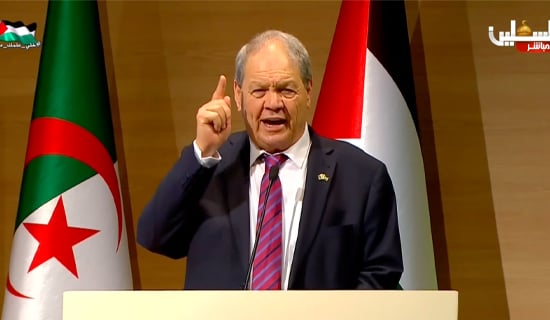Saudi Arabia has recently seen a rising tide of criticism over child bride marriages, especially following the marriage of a 12-year-old girl to her father's 80-year-old cousin who already had three wives.[1] The phenomenon of underage marriage, extensively covered in the Saudi press during the last two years, has come under intense fire from social bodies and activists, and more recently from Saudi princesses, who demanded that it be stopped.
This wave of criticism prompted the Saudi press to publish articles detailing the attempts made by official, legal, and social elements to curb the practice by urging the banning of marriage under the age of 18. So far, however, these attempts have failed to gain momentum, due to the religious custom, well established in Saudi Arabia, permitting the marriage of underage girls based on the tradition that the Prophet Muhammad married his wife 'Aisha when she was only six. [2]
The struggle against child marriages has also intensified in Egypt, which does ban marriage under the age of 18, but which has nevertheless in the past year seen a nationwide increase of child bride marriages. Egyptian Mufti 'Ali Gum'a condemned the phenomenon, calling it a sin deserving of punishment.
The following report reviews the escalating conflict over child bride marriages and current attempts in Egypt and Saudi Arabia to reduce it.
Father Marries Daughter to 80-Year-Old Man

On January 25 of this year, the Saudi press reported on the case of the "Buraidah girl," a 12-year-old child whose mother filed a plea for divorce on her behalf after her father married her to his 80-year-old cousin.[3] At a court proceeding held on January 31, the young girl unexpectedly refused to divorce her husband, saying: "The marriage was carried out with my consent. The marriage official took my feelings into account in drafting the marriage [contract], and I consented to it out of respect for my father."[4] At the same time, it was reported that the girl's mother had revoked her plea for her daughter's divorce after reaching an agreement with the girl's father. The mother's attorney, however, made public his request that the girl's testimony be re-examined in light of concerns that it had been given under duress, and said he would sue for the girl's divorce on the grounds that the status of the wife's family was considered superior to that of the groom's family.[5]
Saudi Higher Judicial Council Chairman Sheikh Saleh bin Hamid responded to the incident by stating that the issue of underage marriage would be settled in a series of legal rulings, to be released by the council in the near future.[6] Sultan bin Zahim, the attorney appointed by the Saudi Human Rights Commission to monitor the progress of the "Buraidah girl" case, said that the commission was working in cooperation with the Interior Ministry and the Justice Ministry to draft a bill that would prohibit marriage under the age of 18. According to the bill, marriages of underage individuals would require special permission from the bride's legal guardian.[7]
Saudi Princesses Demand an End to Underage Marriage
Saudi Princess 'Adelah, daughter of King 'Abdallah, said the "Buraidah girl" case constituted a violation of the rights of the child, but called it an isolated incident not indicative of any trend. According to her statement, measures would soon be taken to put an end to such incidents: "We are currently working with several groups and organizations that deal with the rights of the child, and our position remains consistent with theirs. A child has the right to be a child without being forced into marriage. [Even] an adult wouldn't want [to be forced into marriage], so how could a child want it?"[8]
Saudi Princess Sarah, daughter of Prince Musa'id bin Abd Al-'Aziz, joined the cry against underage marriage, calling for Saudi Mufti Sheikh Abd Al-'Aziz Aal Al-Sheikh to issue a fatwa prohibiting the marriage of minors. Princess Sarah released a communiqué stating: "...The numerous press reports about underage marriage have begun to stir up emotions and to anger the people [because] these girls, who have barely learned to walk, are being treated unjustly and shamefully exploited. In some cases, they are commoditized for the promotion of interests or material gains. In other cases, they are used as weapons of revenge or to settle [personal] accounts. Every time [this happens], their innocence is murdered and their humanity debased before the eyes and ears of the people, and no one can help [them] – since there is no law to protect them."[9]
Criticism of Child Bride Marriages in the Saudi Press
Child bride marriages have remained an issue of public concern in Saudi Arabia for over a year. Columnists who recently addressed the issue, especially following the "Buraidah girl" case, claimed that underage marriage was a form of rape, and that it should be outlawed as soon as possible.
Underage Marriage Tantamount to Rape
In an article titled "The Rape of Childhood" in the Saudi daily 'Okaz, columnist Asma Al-Muhammad wrote: "...The primary aim in marrying a minor is to enjoy the ravaging of the girl's youth... The situation cannot be left as it is, with senior [officials] 'throwing a word or two' to the media like 'we'll investigate, we'll take care of it,' and so on. The hesitation to adopt assertive legislation against the trafficking of adolescent girls, who are minors, disgraces the name of Saudi Arabia... and opens the door to many other violations of [the rights of] the child... Our hearts break every time a girl's childhood is ravaged or a girl is sacrificed on the altar of lust and of the attitude that deprives women [of their rights] and treats them like an object to be bought, sold, and raped..."[10]
Legislation, Not Fatwas
Attorney 'Abd Al-Rahman Al-Lahim published an article in the Saudi daily Al-Watan explaining that there was a need for outlawing underage marriage, not a fatwa against it:[11] "...The issue of underage marriage has legal significance, and is directly linked to international agreements outlawing human trafficking and the violation of [the rights of] the child. Therefore, the issue must be resolved [by the government] – and the deciding factor in this matter is the Justice Ministry, whose minister remains absolutely silent...
"The issue of underage marriage falls under the responsibility of the [state's] legal apparatus, which determines the pace of progress in the country and among the people... just as the transportation laws, for example, [were] not resolved in consultation with the mufti... [and neither was legislation regarding] the trade organizations... These laws were not passed on the basis of a fatwa [issued] by the mufti; rather, the legal apparatus did its natural duty in managing public affairs according to new standards of reality..."[12]
Saudi Arabia Has Enough Single Women Waiting to Marry
Badriya Al-Bashar, Saudi writer and social sciences lecturer at King Saud University, wondered at the incidence of underage marriage in light of the country's high percentage of unmarried women: "Is it reasonable that although we have here 180,000 single women, with one in every 16 women 30 years old and unmarried, we still suffer from [the problem of] underage marriages? Can a normal society accept a 40- or an 80-year-old man passing over an adult woman waiting to marry and ready to bear the responsibility [of marriage], and [instead] appropriating for himself an prepubescent girl...? What can one call a society that does not speak up, and that allows this [to happen]?
"It is irrational and inhumane that we should watch from the sidelines as these crimes are [perpetrated against] children, and remain silent about them. I add my voice to that of the researcher[13] and to those of many other women... [calling] to put an end to the attack on minors, and to hold the Shura Council greatly responsible, as a government institution, [if it leaves] this matter unresolved, for we know today that this issue in its hands."[14]
Struggle Against Child Bride Marriages in Egypt
In Egypt, too, the struggle against underage marriages has intensified following the recent increase in such marriages in several villages and cities. In 2009, roughly 9,300 incidents of marriage under the legal age were recorded, most of them in the districts of Cairo, Al-Mansura, and Tanta. These details were released to the public by the Egyptian attorney general, who, in cooperation with the Family and Community Development Ministry, launched a campaign to enforce Egypt's underage marriage laws.[15]
The authorities also worked to increase public awareness of the matter. The government press made a point of covering the issue of underage marriage in depth, clarifying that it is a criminal offense carrying a maximum penalty of two years' imprisonment and a fine of 500 Egyptian pounds. The press also addressed the causes of the phenomenon and proposed solutions. The government daily Al-Ahram, for example, published statements by experts from Al-Azhar and Ein Shams Universities on studies refuting the belief, widespread among Egyptians and Arabs in general, that marriage to a girl under 16 has a rejuvenating effect on the older men who marry them. Also presented were the findings of studies examining the emotional trauma experienced both by girls who marry at a young age and by the children they bear.
A hotline opened by the Egyptian authorities received 136 complaints of officials performing underage marriages. For instance, a 15-year-old girl complained of her poor family's decision to marry her against her own wishes to a man 12 years her senior. When her family discovered that the groom himself was of meager means, the marriage plans were cancelled. The groom, however, threatened the family and coerced the girl into signing the marriage contract. The young girl ran back home and started a hunger strike, thereby compelling her family to inform the groom of the marriage's annulment. When the groom demanded compensation in the sum of 5,000 Egyptian pounds, the family turned to an attorney, who explained that underage marriage was illegal and referred the family to the authorities for assistance.
Egyptian National Human Rights Council member Samia 'Abd Al-Ghani Al-Mutim pointed out that the increase in these crimes had led to a trend of temporary marriage of young girls to wealthy Arabs, for example, over summer break or holidays, in exchange for a payment of 5,000-10,000 Egyptian pounds, divided among the go-between and attorney involved, the girl's family, and the clerics performing the marriage. Al-Mutim called this a grave phenomenon that seriously threatens social stability; she said that it is not an issue of marriage but of trafficking in young girls – a crime that must be resisted.[16] A report by Egypt's National Council for Childhood and Motherhood stated that 74% of girls in the villages of Abu-Nimris, Al-Hawamidiyya, and Al-Badrashin had been subjected to such temporary marriages.[17]
Egyptian Mufti: Underage Marriages – A Sin
As part of the campaign to increase enforcement of the law, in December 2009 an Egyptian court handed down harsh sentences – a year in prison and a fine – for two officials who had in a single month performed 1,000 marriages of minors by falsifying the girls' birth certificates.[18] In another case, in early February 2010, Egypt's attorney general charged five men with involvement in the underage marriage and sexual abuse of a 14-year-old girl in the city of Tamweh, in Sixth of October Province. The five were the girl's parents, the attorneys who arbitrated the marriage, and the groom – a 73-year-old Saudi.[19]
Following this incident, the Office of the Chief Prosecutor requested the adjudication of Egyptian Mufti Dr. 'Ali Gum'a, who asserted that "in such cases, there is no choice but to impose a stringent punishment on the father, the mother, the arbiter, the lawyer, and the groom, in order to combat this rising trend, especially in the provinces of Sixth of October and Al-Giza." Al-Gum'a added that these are cases of sexual abuse, and that the father who marries his underage daughter to a man the age of her grandfather is a sinner unfit to be guardian of his children."[20]
Egyptian Columnist: Those Who Marry Minors Are Baser than Animals
Al-Azhar lecturer Dr. 'Abdallah Al-Nagar also addressed the issue of underage marriages. In his column in the Egyptian government daily Al-Gumhouriyya, he wrote: "The reports in the media of underage marriages in the villages of Al-Hawamidiyya, Al-Giza, and Bilbis cause shame and disgrace, due to the audacity of the crimes these marriages represent – which, to be honest, are not marriages, but vile trafficking in human flesh perpetrated by people who have lost their religion, their conscience, and their shame, and who have become baser than animals...
"It is inconceivable that a father would take his juvenile daughter, not yet 14, and hand her over to a rapacious wild animal who has lost touch with the meaning of respect, manliness, shame, and faith, an animal who thus exploits the poverty of the insolent father or his need for money... a beast who will devour her and bite her flesh for a handful of coins – less than the price of the sheep slaughtered daily in his town.
"It is said that the price of the victim is 10,000 Egyptian pounds, of which 2,000 goes to the person who brokered [the marriage]. After [the groom] purchases [the girl], who is unaware that what is being done to her is a crime of the basest and most despicable sort... the depraved Gulf Arab takes her away to his home in one of the luxury neighborhoods in Cairo, and mercilessly takes her virginity... And he continues to have sexual intercourse with her until he becomes sated or tired, or until she screams, crying for help and threatening to jump out of the [window of] the animal's high-rise apartment...
"What sort of conscience do these savage, barbarian Arabs have, who were sated after their hunger, but did not even thank God for the oil, the money, and the life of leisure that he bestowed upon them... but instead dishonored us and preyed upon our daughters in this barbaric and insolent manner... How can we allow such immorality to take place, without attacking its perpetrator with shoes?..."[21]
Cartoons in Saudi Press Criticize Child Bride Marriages
Criticism of child bridge marriages was also expressed in cartoons published in Saudi dailies:
The Dowry for a Child Bride Marriage
Al-Jazeera (Saudi Arabia), January 20, 2010
Cartoonist: Hajed
The Wedding Ring
Al-Jazeera (Saudi Arabia), January 24, 2010
Cartoonist: Hajed

Al-Jazeera (Saudi Arabia), January 20, 2010
Cartoonist: 'Abdallah Jaber
Old Man Proposes to Young Girl Before Crowd of Spinsters 
Al-Watan (Saudi Arabia), February 6, 2010
Cartoonist: 'Abd Al-'Aziz Al-Muzini
"Your Money [Bought] a Child to Bear You More Children!!"
Al-Watan (Saudi Arabia), February 26, 2010
Cartoonist: 'Abd Al-'Aziz Al-Muzini
Seductions on the Way to Bed
Al-Riyadh (Saudi Arabia), January 20, 2010
Cartoonist: Rabi'a

Al-Sharq Al-Awsat (London) February 14, 2010
Cartoonist: Al-Rais

Al-Jazeera (Saudi Arabia), January 29, 2010
Cartoonist: Hajed
"Child Marriage"
Al-Watan (Saudi Arabia), February 4, 2010
Cartoonist: Jihad Awartani
*Y. Admon and L. Azuri are Research Fellows at MEMRI.
Endnotes:
[1] According to statistics, in Saudi Arabia over 3,000 girls under 13 have been married to men the age of their fathers or grandfathers (Al-Riyadh, Saudi Arabia, January, 22, 2010). See MEMRI Inquiry & Analysis No.502, "Rising Criticism of Child Bride Marriages in Saudi Arabia," March 8, 2009, Rising Criticism of Child Bride Marriages in Saudi Arabia.
[2] For a recent interview with a Saudi cleric who defends the custom, see MEMRI TV Clip No. 2399 "Saudi Cleric Muhammad Musa Al-Sharif Defends the Marrying Off of Under-Age Girls in Saudi Arabia: Atheists, Christians, and Fornicators Are Responsible for Human Rights Treaties," February 19, http://www.memritv.org/clip_transcript/en/2399.htm.
[3] Al-Hayat (Saudi Arabia), January 25, 2010. It should be noted that, in July 2009, a Saudi court approved the divorce of a 12-year-old girl from a 37-year-old man ('Okaz, Saudi Arabia, July 16, 2009).
[4] 'Okaz (Saudi Arabia), February 8, 2010.
[5] 'Okaz (Saudi Arabia), February 8, 2010. For more on divorce when the status of the wife's family is considered superior to that of her husband's family, see MEMRI Inquiry & Analysis No. 349, "Public Debate in Saudi Arabia over Forcing Divorce When Status of Wife's Family Is Superior to That of Husband's Family," April 27, 2007, Public Debate in Saudi Arabia Over Forcing Divorce When Status Of Wife's Family Is Superior to That of Husband's Family.
[6] Al-Sharq Al-Awsat (London), January 27, 2010.
[7] Sabaq (Saudi Arabia), February 5, 2010.
[8] Al-Riyadh (Saudi Arabia), February 2, 2010.
[9] http://www.elaph.com, February 5, 2010.
[10] 'Okaz (Saudi Arabia), February 3, 2010.
[11] Attorney 'Abd Al-Rahman Al-Lahim is a Saudi civil rights activist who was arrested by authorities in 2004, along with fellow Saudi activists Matrouk Al-Faleh, 'Abdallah Al-Hamid, and 'Ali Al-Dumaini, after the group demanded that the previous Saudi king carry out legal reforms. They were released shortly after King Abdallah's ascension to the throne in 2005.
[12] Al-Watan (Saudi Arabia), January 24, 2010.
[13] This refers to Fawzia Al-Khaliwi, a Saudi researcher who proposed, to the Shura Council, an initiative to prevent underage marriage.
[14] Al-Hayat (Saudi Arabia), January 26, 2010.
[15] Al-Masri Al-Yawm (Egypt), December 18, 2009.
[16] Al-Ahram (Egypt), February 10, 2010; for more on temporary marriages, see MEMRI Inquiry & Analysis No. 291, "Pleasure Marriages in Sunni and Shi'ite Islam," August 31, 2006, Pleasure Marriages in Sunni and Shi'ite Islam.
[17] Al-Masri Al-Yawm (Egypt), February 11, 2010.
[18] Al-Ahram (Egypt), December 24, 2009.
[19] Al-Masri Al-Yawm (Egypt), February 1, 2010.
[20] Al-Masri Al-Yawm (Egypt), February 10, 2010.
[21] Al-Gumhouriyya (Egypt), January 26, 2010.








